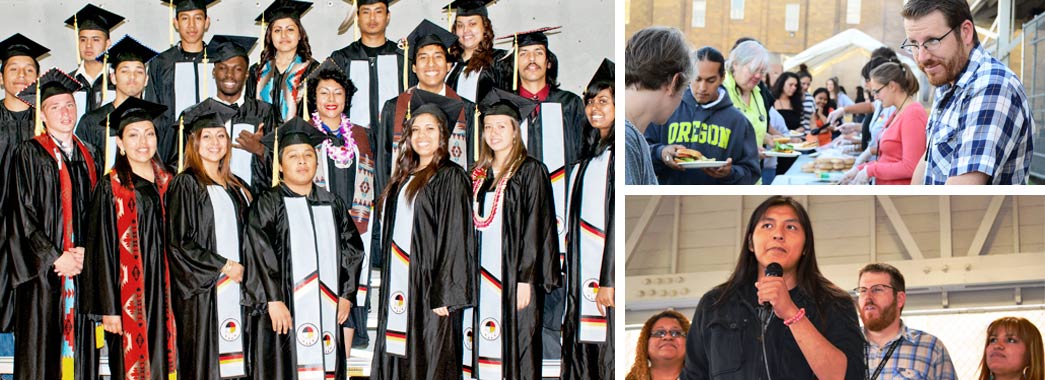Native Graduation Rates Rise In PPS
New graduation numbers show a 15 point gain in the graduation rate for Native American students who attend Portland Public Schools. While substantial, and cause for celebration, the graduation rate remains below 50% for Native American youth, demonstrating the need to do more.
NAYA has been working in partnership with Portland Public Schools for more than five years, along with other area middle and high schools, to improve the educational attainment of Native American students. Our programs offer a range of advocacy, support and guidance that enable Native students to close the achievement gap with their peers. Educational Youth Advocates help individual students develop plans for academic and career success, and refer students to other services at NAYA to provide crucial balance to their lives.
“I’m pleased to see our Native students make such a significant gain in graduation rates,” said PPS Superintendent Carole Smith. “Whenever there’s an increase, I know it takes a team, and I appreciate all those who worked so hard to make these gains. However, we still have much work to do. I look forward to working with NAYA and other partners to continue to improve the outcomes for Native students and all historically underserved communities in Portland schools.”
“We are excited to see PPS headed in the right direction,” said Matt Morton, Squaxin Island Tribe, Executive Director of the Native American Youth and Family Center (NAYA) and a PPS School Board member. “We look forward to continue our partnership with the district to build upon these gains.”
NAYA’s Early College Academy (ECA) is an example of how PPS’ partnerships with culturally-specific organizations can improve outcomes for youth of color. Students come to the ECA to honor their Native heritage, to receive specialized instruction, and to access the on-site services at NAYA that lead to lifetime success. ECA students often arrive credit deficient, having dropped out, experiencing expulsion, or with attendance and behavioral issues. Through involvement in College and Career services, mentoring, life skills classes, and cultural and recreational activities, students become productive and successful scholars, tradespeople and professionals. Though ECA’s non-traditional, highly-supportive model is not directly comparable to PPS, 90% of ECA students will receive a diploma.
“We have much work to do in order to reach equity for our students, but we’re pleased to see these initial investments paying off, and will work to continue increasing graduation rates,” Morton said.
The importance of culturally-specific services drives the work of the Early College Academy. Our annual ECA Luncheon is a great opportunity to support our students and bring together our community partners to celebrate our successes. Learn more, and consider sponsoring the luncheon, by clicking here.
